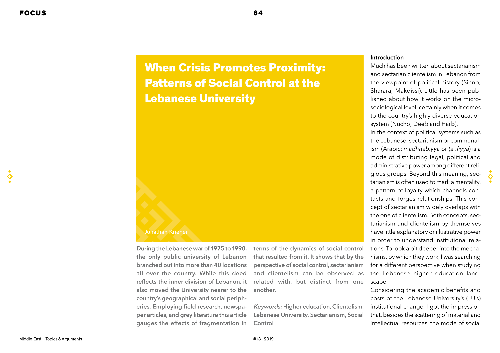When Crisis Promotes Proximity Patterns of Social Control at the Lebanese University
During the Lebanese war of 1975 to 1990, the only public university of Lebanon branched out into more than 40 locations all over the country. While this deed reflects the inner division of Lebanon, it also moved the University nearer to the country’s geographical and social peripheries. Employing fi...
שמור ב:
| הוצא לאור ב: | Middle East - Topics & Arguments |
|---|---|
| מחבר ראשי: | |
| פורמט: | Artikel (Zeitschrift) |
| שפה: | אנגלית |
| יצא לאור: |
Philipps-Universität Marburg
2019
|
| נושאים: | |
| גישה מקוונת: | גישה מקוונת |
| תגים: |
אין תגיות, היה/י הראשונ/ה לתייג את הרשומה!
|
| סיכום: | During the Lebanese war of 1975 to 1990, the only public university of Lebanon branched out into more than 40 locations all over the country. While this deed reflects the inner division of Lebanon, it also moved the University nearer to the country’s geographical and social peripheries. Employing field research, newspaper articles, and grey literature this article gauges the effects of fragmentation in terms of the dynamics of social control that resulted from it. It shows that by the perspective of social control, sectarianism and clientelism can be observed as related with, but distinct from one another. |
|---|---|
| DOI: | 10.17192/meta.2019.13.8091 |
